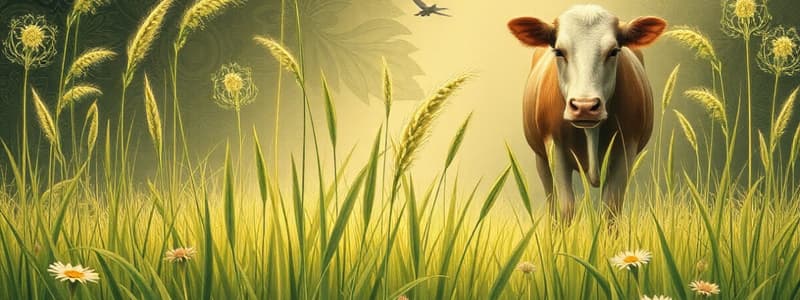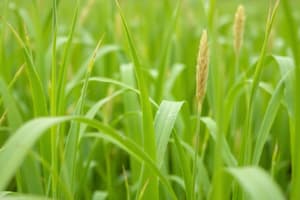Podcast
Questions and Answers
What specific physiological changes occur in grasses during the vegetative stage?
What specific physiological changes occur in grasses during the vegetative stage?
In the vegetative stage, tillers grow, stems remain compact, and older leaves die off.
How does the elongation stage of grass growth contribute to overall plant development?
How does the elongation stage of grass growth contribute to overall plant development?
The elongation stage involves the stem developing and lengthening between the upper nodes, finishing as the seed head is about to form.
How do fertilization and liming contribute to sustainable grazing practices on permanent grasslands?
How do fertilization and liming contribute to sustainable grazing practices on permanent grasslands?
They maintain the quality and productivity of the grassland, which supports ongoing grazing activities.
Why is Dry Matter Digestibility (DMD) a critical factor in evaluating grass quality?
Why is Dry Matter Digestibility (DMD) a critical factor in evaluating grass quality?
What is the impact of palatability on animal grazing behavior in pasture systems?
What is the impact of palatability on animal grazing behavior in pasture systems?
In what specific ways do hairy leaves and stems differentiate between clover types?
In what specific ways do hairy leaves and stems differentiate between clover types?
Compare the life cycles of biennial and perennial grasses and their implications for pasture management.
Compare the life cycles of biennial and perennial grasses and their implications for pasture management.
What impact does nitrogen fixation by legumes like clover have on soil fertility?
What impact does nitrogen fixation by legumes like clover have on soil fertility?
What are the key advantages of implementing paddock grazing as a management technique?
What are the key advantages of implementing paddock grazing as a management technique?
What distinguishes permanent grassland from rough mountain grazing in terms of cultivation?
What distinguishes permanent grassland from rough mountain grazing in terms of cultivation?
Identify two methods to improve the productivity levels of rough mountain grazing and explain their effects.
Identify two methods to improve the productivity levels of rough mountain grazing and explain their effects.
How do biennial plants differ from perennial plants regarding their life cycle and longevity?
How do biennial plants differ from perennial plants regarding their life cycle and longevity?
In grazing systems, what agricultural purpose do leys serve, and how do they relate to grazing frequency?
In grazing systems, what agricultural purpose do leys serve, and how do they relate to grazing frequency?
What factors contribute to the lower persistence of white clover compared to other types?
What factors contribute to the lower persistence of white clover compared to other types?
Why is the high protein content of clover particularly beneficial for livestock?
Why is the high protein content of clover particularly beneficial for livestock?
Discuss the role of nitrogen fixation in legumes and its effects on surrounding pasture productivity.
Discuss the role of nitrogen fixation in legumes and its effects on surrounding pasture productivity.
How does clover’s growth habit reduce the reliance on chemical fertilizers?
How does clover’s growth habit reduce the reliance on chemical fertilizers?
How do biennial plants impact forage availability in grazing systems compared to perennial plants?
How do biennial plants impact forage availability in grazing systems compared to perennial plants?
Discuss the relationship between fertilization, liming, and the productivity of permanent grasslands.
Discuss the relationship between fertilization, liming, and the productivity of permanent grasslands.
What is the ecological significance of distinguishing between different types of clover in grassland management?
What is the ecological significance of distinguishing between different types of clover in grassland management?
Flashcards are hidden until you start studying
Study Notes
Vegetative Stage of Grass Growth
- During the vegetative stage, tillers grow, allowing for increased grass density.
- Stems remain compact, providing structural stability and maximizing light capture.
- Older leaves die off, making way for new growth and utilization of resources.
Elongation Stage of Grass Growth
- In this stage, the stem elongates between the upper nodes.
- The elongation process finishes with the formation of the seed head.
Dry Matter Digestibility (DMD)
- DMD indicates the digestible percentage of dry matter in grass for animals.
- It reflects the nutritional value and quality of the grass available for livestock consumption.
Role of Palatability in Grazing
- Palatability influences animal preferences and behavior during grazing.
- Pleasant-tasting grass promotes increased forage selection, enhancing grazing system effectiveness.
Biennial vs. Perennial Grass Types
- Biennial grasses complete their life cycle across two years, emphasizing vegetative growth in the first year.
- Perennial grasses regrow annually, capable of producing multiple growth cycles each season.
Permanent Grassland vs. Rough Mountain Grazing
- Permanent grassland remains undisturbed as it is never ploughed.
- Rough mountain grazing involves more challenging cultivation due to poor-quality vegetation.
Improving Rough Mountain Grazing Productivity
- Productivity can be enhanced through liming and reseeding strategies to improve grass quality.
Agricultural Use of Leys
- Leys are temporary sown forage crops, specifically designed for grazing, requiring frequent reseeding.
Nitrogen Fixation in Legumes
- Legume nitrogen fixation enriches soil fertility and benefits surrounding plants, improving pasture productivity.
Biennial vs. Perennial Plants in Grazing
- Biennial plants live for two years while perennial plants offer a continuous forage source over several years.
Leys' Characteristics in Grazing Management
- Leys exhibit low variability in botanical composition, impacting grazing management strategies.
- High stocking rates on leys can lead to increased grazing pressure and improved forage quality.
Botanical Composition in Rough Mountain Grazing
- Rough mountain grazing displays variable botanical composition, contributing to low production levels and stocking rates.
Fertilization and Liming in Permanent Grassland
- Fertilization and liming practices maintain grassland quality, supporting sustainable grazing management.
Identifying Clover Types
- Hairy leaves and stems of clovers help distinguish between different types, with smooth leaves indicating white clover.
Importance of Nitrogen Fixation in Clover
- Nitrogen fixation in legumes like clover enhances soil fertility by making atmospheric nitrogen accessible to plants.
Advantages of Paddock Grazing
- Paddock grazing optimizes grass resource use, ensuring efficient utilization of forage.
Longevity in Plants
- Biennial plants finish their lifecycle in two years, compared to perennial plants that can live for multiple years.
Persistence of White Clover
- White clover is generally less persistent due to specific growth traits and adaptability challenges.
Benefits of Clover’s High Protein Content
- High protein levels in clover are crucial for livestock growth and milk production efficiency.
Clover's Role in Reducing Chemical Fertilizer Needs
- Clover’s nitrogen-fixing properties decrease the need for chemical fertilizers, promoting environmental sustainability.
Studying That Suits You
Use AI to generate personalized quizzes and flashcards to suit your learning preferences.




